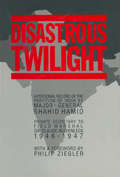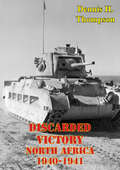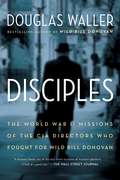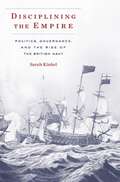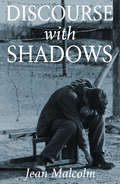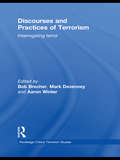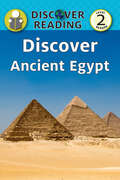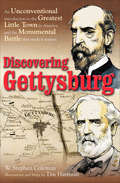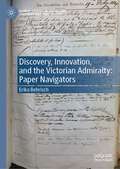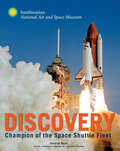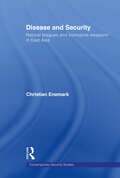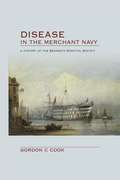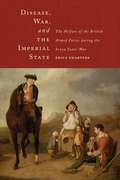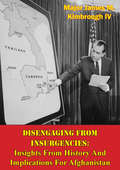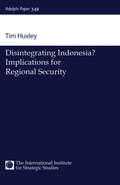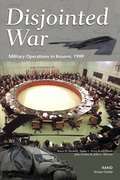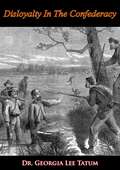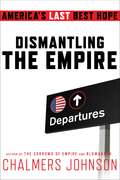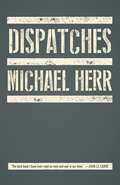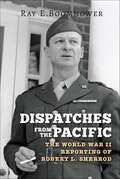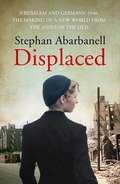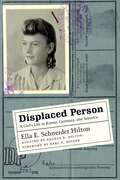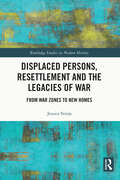- Table View
- List View
Disastrous Twilight: A Personal Record of the Partition of india by Major-General Shahid Hamid
by Shahid AmidThe Partition of India in 1947 probably created more problems than it solved, problems which have bedevilled the subcontinent ever since and which show no sign of going away, since those who feel that they were hard done by at the time of the settlement nearly forty years ago harbour their grudges as fiercely as ever and clearly have no intention of accepting- their lot with equanimity in the foreseeable future. Any new assessment of the Partition is therefore doubly welcome - both as a contribution to history and as an aid to an understanding of what, in current jargon, is still very much an "on-going situation". General Hamid's book is of particular value in view of the unique vantage point from which it was written. In 1946 he was appointed Personal Secretary to Field-Marshal Sir Claude Auchinleck, then Commander-in-Chief, India. Realising that he had the good fortune to have been given a ringside seat for possibly the greatest of all the dramas in his country's history. Hamid decided to keep a diary which is only now being published because the author was made to promise that it would appear during the Auk's lifetime, a gesture typical of that very great and good but essentially private man. Hamid was in constant contact with all those people the sum of whose decisions were to lead to one of the greatest mass migrations, accompanied by one of the greatest mass migrations, accompanied by one of the greatest bloodbaths in the history of mankind. His observations on the build-up to this appalling tragedy have the added value of being untainted by hindsight, and though many may not agree with all his opinions, few will deny that the views he expressed at the time have stood up to the judgement of history remarkably well.
Discarded Victory - North Africa, 1940-1941
by Dennis H. ThompsonThe Anglo-Italian campaign of 1940-41 resulted in one of the most lopsided operational victories of the entire Second World War. Strategic misjudgement at the highest levels of British political and military leadership would discard the opportunities won by its fighting forces in North Africa and commit them to a catastrophic intervention in Greece. In 1940, Italy fielded a numerically overwhelming, but technologically deficient, conscript military force on the continent of Africa. Italy’s political leaders expected her 500,000 strong North African army to quickly defeat the British troops stationed in the theater of operation. The British forces, though inferior in numbers, were well-trained regulars who possessed more superior weaponry than their Italian foes. In the brief, high intensity conflict waged in the North African deserts from December 1940 to February 1941, the British would annihilate an Italian army of 130,000 soldiers. On the verge of complete victory in the North African theater, the British would commit an act of extraordinary strategic misjudgement and divert their efforts to Greece in order to engage the Axis forces on the continent of Europe. The discarded early victory in North Africa would lead Britain to catastrophe in Greece, cost them the initiative in the war, and nearly led to their defeat in North Africa.
Disciples: The World War II Missions of the CIA Directors Who Fought for Wild Bill Donovan
by Douglas WallerThe author of the critically acclaimed bestseller Wild Bill Donovan, tells the story of four OSS warriors of World War II. All four later led the CIA.They are the most famous and controversial directors the CIA has ever had--Allen Dulles, Richard Helms, William Colby, and William Casey. Disciples is the story of these dynamic agents and their daring espionage and sabotage in wartime Europe under OSS Director Bill Donovan. Allen Dulles ran the OSS's most successful spy operation against the Axis. Bill Casey organized dangerous missions to penetrate Nazi Germany. Bill Colby led OSS commando raids behind the lines in occupied France and Norway. Richard Helms mounted risky intelligence programs against the Russians in the ruin of Berlin after the German surrender. Four very different men, they later led (or misled) the successor CIA. Dulles launched the calamitous operation to land CIA-trained, anti-Castro guerrillas at Cuba's Bay of Pigs. Helms was convicted of lying to Congress about the CIA's effort to oust Chile's president. Colby would become a pariah for releasing to Congress what became known as the "Family Jewels" report on CIA misdeeds during the 1950s, sixties and early seventies. Casey would nearly bring down the CIA--and Ronald Reagan's presidency--from a scheme to secretly supply Nicaragua's contras with money raked off from the sale of arms to Iran for American hostages in Beirut. Mining thousands of once-secret World War II documents and interviewing scores of family members and CIA colleagues, Waller has written a brilliant successor to Wild Bill Donovan.
Disciplining the Empire: Politics, Governance, and the Rise of the British Navy (Harvard historical studies ; #v. 189)
by Sarah Kinkel“Rule Britannia! Britannia rule the waves,” goes the popular lyric. The fact that the British built the world’s greatest empire on the basis of sea power has led many to assume that the Royal Navy’s place in British life was unchallenged. Yet, as Sarah Kinkel shows, the Navy was the subject of bitter political debate. The rise of British naval power was neither inevitable nor unquestioned: it was the outcome of fierce battles over the shape of Britain’s empire and the bonds of political authority. Disciplining the Empire explains why the Navy became divisive within Anglo-imperial society even though it was also successful in war. The eighteenth century witnessed the global expansion of British imperial rule, the emergence of new forms of political radicalism, and the fracturing of the British Atlantic in a civil war. The Navy was at the center of these developments. Advocates of a more strictly governed, centralized empire deliberately reshaped the Navy into a disciplined and hierarchical force which they hoped would win battles but also help control imperial populations. When these newly professionalized sea officers were sent to the front lines of trade policing in North America during the 1760s, opponents saw it as an extension of executive power and military authority over civilians—and thus proof of constitutional corruption at home. The Navy was one among many battlefields where eighteenth-century British subjects struggled to reconcile their debates over liberty and anarchy, and determine whether the empire would be ruled from Parliament down or the people up.
Discourse with Shadows
by Jean Eileen MalcolmDiscourse with Shadows, first published in 1958, is a stark, yet compassionate look at the lives of four Nazi concentration camp survivors and of a friend who returns to Frankfurt from England to locate a missing relative and her son Johann. Driven by their long-repressed anger, the group carries out the murder of a Nazi woman who often attended the tortures at the concentration camp; dire consequences follow which threaten the group of friends.From the dustjacket: The scene is Frankfurt at the late war’s end: living there are four survivors of a Nazi concentration camp—and Franz Grünwald, who has spent the years since 1935 in England and has now returned to his former home town in search of a relative. We shall only add that the author displays here—in a first novel—such a power of sympathetic imagination as seems to us quite extraordinary. This is an extremely moving book; and while terror and wickedness are never far away, and no attempt is made to see things other than as they are, the total effect given is not only of compassion but also of beauty.
Discourses and Practices of Terrorism: Interrogating Terror (Routledge Critical Terrorism Studies)
by Bob BrecherThis interdisciplinary book investigates the consequences of the language of terror for our lives in democratic societies. The approach of this book is in direct contrast with those that either view terrorism simplistically, as a clear reality threatening democratic society and thus requiring certain sorts of response, or argue, equally simplistically, that the invocation of terror is merely the ideological veil for continued capitalist exploitation. While closer in spirit to the second of these, this work does not simply dismiss the discourse on terror, but rather investigates the consequences of this discourse for the organisation of life in democratic societies. In interrogating the discourse of terror from a variety of viewpoints, this interdisciplinary text builds upon the understanding of the importance of the language of terror from a new perspective: the interconnections between discourses of terror; the material realities they at once reflect and help produce; and the specificities of particular historical circumstances. In offering an integrated approach of this sort, and founded on a base of applied philosophy, broadly conceived, the contributors offer a new contribution to both public and academic debate, and at the same time initiate a series of further interventions in Critical Terrorism Studies. This book will be of interest to students of critical terrorism studies, terrorism studies, security studies, philosophy and discourse theory. Bob Brecher is Director of the Centre for Applied Philosophy, Politics & Ethics at Brighton University. He has published widely in moral, political and applied philosophy and the politics of higher education. Mark Devenney is Academic Programme Leader in Humanities at the University of Brighton. He has published in the areas of critical theory, post-Marxism and post-Colonial politics. Aaron Winter is Lecturer in Sociology at the University of Abertay Dundee. His research focuses on terrorism and the concept of ‘extremism’, whiteness, masculinity and violence, and the extreme right, organised racism and the religious right in the United States.
Discover Ancient Egypt: Level 2 Reader (Discover Reading)
by Amanda TraneMonkey Fun! proves that you’re never too young to begin your learning adventure. It’s a barrel of fun and chock full of interesting monkey facts written in easy to understand rhyming verse for toddlers ages 0-4. “That’s not a monkey who’s peeling a grape. Bigger and tailless, he must be an ape.” “Monkeys who live in a family group, travel together and share with their troop.” Bold, colorful illustrations by Aida Barba Flores will capture the attention of young readers and aid in story comprehension. This is an edutaining rhyming adventure that offers fun learning resources in the back of the book including, Mrs. Dweck’s monkey facts and a monkey counting game.
Discovering Gettysburg: An Unconventional Introduction to the Greatest Little Town in America and the Monumental Battle that Made It Famous
by W. Stephen Coleman Tim HartmanGettysburg.Does any other single word in any language invoke so much passion and angst, enthusiasm and sadness, as do those ten letters? But what IS Gettysburg, exactly? I am almost embarrassed to say I discovered the answer to that questionor at least approached an answeronly late in life.Of course, Gettysburg is a small charming city nestled in south-central Pennsylvania, but in so many ways it beggars description. For about half the year its streets are mainly empty, its businesses quiet, the weather cold and blustery. For the other months, however, the place literally teems with hundreds of thousands of visitors, bustling streets and shops, and more than a handful of unique larger-than-life characters whose fan base spans the globe.And then there is the battlethe eventof the Civil War. The battle that raged there during the first days of July 1863 at the price of more than 50,000 casualties decided much (just how much depending upon who you believe) and forever stamped that place with its passion and angst and enthusiasm and its lingering, forever sadness. Its monuments and guns and plaques tell the story of the colossal clash of arms and societies, just as its National Cemetery bears silent witness to at least part of the cost of that bloody event.And somehow this greatest little town in America, this mammoth battle, its influential characters (living and dead), its deep meaning and profound influence on our society largely escaped me for nearly six decades. That ended a couple years ago when I finally paid a visit. My journey from the uninitiated to the fully converted only took a short time, but I felt compelled to pen my experiences as they unfolded. And so you hold in your hands Discovering Gettysburg: An Unconventional Introduction to the Greatest Little Town in America and the Monumental Battle that Made It Famous.In it, you will visit with me a host of famous and off-the-beaten-path places on the battlefield, explore the historic town of Gettysburg as it is today, chat with some of the towns fascinating resources, and follow along, as I did, with some of the most engaging storytelling I have ever had the pleasure of hearing. And nowhere inside will you be bothered with footnotes or stumble your way through academic mumbo jumbo. Thankfully, my friend and award-winning cartoonist Tim Hartman agreed to provide the magnificent maps and outstanding caricatures that grace this book.Discovering Gettysburg is, I fully admit, rather unconventional. But so is the place, the event, and the experience of that hallowed ground.
Discovery, Innovation, and the Victorian Admiralty: Paper Navigators (Global Studies in Social and Cultural Maritime History)
by Erika BehrischThis book examines the British Admiralty’s engagement with science and technological innovation in the nineteenth century. It is a book about people, and gross misunderstanding, about the dreams and disappointments of scientific workers and inventors in relation to the administrators who adjudicated their requests for support, and about the power of paper to escalate arguments, reduce opinions, and frustrate hopes. From instructions for naval surveying to debates about rewards to civilians for inventions, Paper Navigators puts a wide range of primary sources in the context of public debates and explores the British Admiralty’s engagement with, decision-making around, and management of questions of value, support, and funding with citizen inventors, the broader public, and their own employees. Concentrating on the Admiralty’s private, internal correspondence to explore these themes, it offers a fresh perspective on the Victorian Navy's history of innovation and exploration and is a novel addition to literature on the history of science in the nineteenth century.
Discovery: Champion of the Space Shuttle Fleet
by Valerie NealThis book places Space Shuttle Discovery within the history of the space shuttle program and provides an introduction to space shuttle technology, with a focus on the orbiter itself. Discovery's unique history is presented mission by mission that includes a brief narrative of each mission, a chart of its key statistics (dates, duration, altitude, payloads, etc.), each mission's patch with an explanation of its unique symbolism, a crew portrait, and two to four iconic photos that capture the distinct activities and successes of each mission. The book also features anecdotes and memories of several astronauts who flew on Discovery, as well as its modernization over the years and its final preparation for retirement at the Smithsonian.
Disease and Security: Natural Plagues and Biological Weapons in East Asia (Contemporary Security Studies)
by Christian EnemarkFocusing on East Asia, this book sets out a framework for analyzing infectious disease threats in security terms. It covers the security significance of naturally occurring disease outbreak events such as SARS and avian influenza, the development and use of biological weapons by state and non-state actors, and the security risks associated with laboratory research on pathogenic micro-organisms. Christian Enemark devises a conceptual framework for securitization that is useful for policy makers by using the overlaps and synergies between different infectious disease threats. The book draws heavily on material from public health and scientific literature to illustrate the cross-disciplinary requirements for addressing infectious diseases challenges in security terms. Fast-moving, naturally occurring disease threats are of increasing concern to governments and individuals, and it is therefore important to recognize their close relationship to the security challenges posed by Biological Weapons and pathogen research. Disease and Security will be of much interest to students of international security, public health and Asian politics.
Disease in the Merchant Navy: A History of the Seamen's Hospital Society
by Gordon Cook Anna PavlovIn this unique, highly detailed examination, Gordon C Cook explores disease in the merchant navy through the history of the Seamen's Hospital Society. From its foundation in 1812, until the present day, the Seamen's Hospital Society has been responsible for the physical welfare of merchant seamen and has headed many remarkable advances in medical science. This handsome volume is ideal for all those with an interest in the Seamen's Hospital Society, medical and naval historians, and general readers with an interest in maritime and naval history.
Disease, War, and the Imperial State: The Welfare of the British Armed Forces during the Seven Years' War
by Erica ChartersThe Seven YearsOCO War, often called the first global war, spanned North America, the West Indies, Europe, and India. a In these locations diseases such as scurvy, smallpox, and yellow fever killed far more than combat did, stretching the resources of European states. Ina"Disease, War, and the Imperial State," Erica Charters demonstrates how disease played a vital role in shaping strategy and campaigning, British state policy, and imperial relations during the Seven YearsOCO War. Military medicine was a crucial component of the British war effort; it was central to both eighteenth-century scientific innovation and the moral authority of the British state. Looking beyond the traditional focus of the British state as a fiscal war-making machine, Charters uncovers an imperial state conspicuously attending to the welfare of its armed forces, investing in medical research, and responding to local public opinion. a Charters shows military medicine to be a credible scientific endeavor that was similarly responsive to local conditions and demands. "Disease, War, and the Imperial State"ais an engaging study of early modern warfare and statecraft, one focused on the endless and laborious task of managing manpower in the face of virulent disease in the field, political opposition at home, and the clamor of public opinion in both Britain and its colonies. "
Disengaging From Insurgencies: Insights From History And Implications For Afghanistan
by Major James M. Kimbrough IVTo determine insights for future disengagements, this thesis examines four historical episodes in which Western nations withdrew from on-going conflicts against insurgent-like enemies.Relatively unsuccessful results flowed from the British withdrawal from Aden during the 1960's and the American withdrawal from Vietnam during 1972-1973. As the last British troop departed Aden, a state of turmoil prevailed. Not only could the insurgents realistically claim victory in evicting the British by force, but also the territory later became the Arab world's first Marxist state and a base for terrorists. America's departure from Vietnam produced similar disappointment.More successful outcomes occurred during the British withdrawal from Malaya in the 1960's and the American withdrawal from El Salvador in 1988-1989. After World War II, the British attempted to re-establish colonial control of Malaya and faced resistance from communist insurgents. In the midst of their counterinsurgency, the British government granted Malaya independence in August 1957. The Malayan government, backed by British support, continued its struggle against the communist insurgents for another three years. The Malayan government announced victory in 1960 and began to enjoy a relatively peaceful and prosperous aftermath. From kidnappings, assassinations, and other political-criminal activities, an insurgency emerged in El Salvador in 1979. As the movement transitioned to guerrilla warfare, the insurgent fighters rivaled the strength of the Salvadoran security forces. From 1980-1992, the government of the United States provided El Salvador extensive funding for social and political reforms, military material support, and training to counter the communist insurgents. These efforts, coupled with effective El Salvadoran governance, eventually led the communists to abandon their cause.
Disintegrating Indonesia?: Implications for Regional Security (Adelphi series #No.349)
by Tim HuxleySince the collapse of President Suharto's New Order regime in 1998 and the international intervention in East Timor in 1999, there has been much speculation in South-east Asia and the West over whether Indonesia - weakened by economic difficulties, social distresses and political instability - has a future as a coherent nation-state. This paper argues that although the separatist struggles in Aceh or Papua are unlikely to suceed in the foreseeable future, other problems threaten to undermine the central government's control. Communal disputes have led to chronic violence in Maluku, Central Sulawesi, and Kalimantan. Simultaneously, tension between Islamic and secular political forces has grown. Indonesia's disarray has prompted international concern over an array of security threats, including contagious secessionism, Islamic terrorism, the movement through Indonesia of asylum-seekers, piracy and environmental dangers. In order to contain these security implications of Indonesia's protracted crisis, concerned governments should continue assisting its fragile reform process, particularly by helping Jakarta to manage the country's massive international debt. However, they should also coordinate their contingency planning for a further crumbling of Jakarta's authority.
Disjointed War: Military Operations in Kosovo 1999
by Bruce R. Pirnie Walter L. Perry John G. Mcginn John Gordon Bruce NardulliAn examination of the 1999 conflict in Kosovo, with a focus on joint military operations. The 1999 military operation against the Yugoslav Army in Kosovo suggests several areas in which Joint military operations were deficient. This study examined all aspects of the Kosovo conflict,including its political and historical underpinnings, in an attempt to understand these deficiencies and to recommend improvements. This document--provided in both a classified and unclassified version--is based on extensive original source documents and interviews with most of the principal participants, and serves as the definitive Army record on Kosovo. While the primary focus of the research was on U.S.Army involvement, it covered many other aspects of Operation Allied Force. Topics included NATO objectives in Operation Allied Force, air and ground planning, evolution of the air operation and its effects on fielded Yugoslav forces, Task Force Hawk, and peace operations. The 1999 military operation in Kosovo suggests several areas in which Joint military operations were deficient. This study examines all aspects of the Kosovo conflict, with a focus on U.S. Army involvement, including its political and historical underpinnings, in an attempt to understand these deficiencies and to recommend improvements.
Disloyal Opposition (Destroyer #123)
by James MullaneyWhen a former soviet general turned black market assembles a particle ray gun in Burkly, and then turns on the hippy anarchists who hired him, it is time to send in Remo and Chiun; the last masters of Sinanju.
Disloyalty In The Confederacy
by Dr Georgia Lee Tatum"Until recently, many historians, as well as people in general, have commonly accepted the idea that every man, woman, and child in the South stood loyally behind Jefferson Davis and the Stars and Bars in support of the Confederacy. Despite the fact that out of a population of about eight million whites, six hundred thousand offered their services to the Confederacy in 1861, and also the fact that the staunch, unswerving loyalty of Southerners during the war will continue to rouse admiration, there was, in 1861, a small number, which by 1865 had increased to a potent minority, that did nothing to aid the Confederacy and much to injure it. While many showed their disaffection only by refusing to fight, many others organized not only for self-protection but also for the destruction of the Confederacy. Before the end of the war, there was much disaffection in every state, and many of the disloyal had formed into bands--in some states into well organized, active societies, with signs, oaths, grips, and passwords. In the present study, an attempt has been made to discover the causes for this movement, the classes that participated in it, and the purpose and work of the organizations."Disloyalty in the Confederacy definitely puts to rout the belief, once common, that 'every man, woman and child stood behind Jefferson Davis and the Stars and Bars in support of the Confederacy.' --New York Times Book Review"This is the sort of book necessary to balance accounts of the Southern Confederacy. Heretofore, the impression has been too often left that the South fought as a unit with a common purpose."--Journal of Southern History
Dismantling the Empire: America's Last Best Hope
by Chalmers JohnsonThe author of the bestselling Blowback Trilogy reflects on America's waning power in a masterful collection of essays. In his prophetic book Blowback, published before 9/11, Chalmers Johnson warned that our secret operations in Iraq and elsewhere around the globe would exact a price at home. Now, in a brilliant series of essays written over the last three years, Johnson measures that price and the resulting dangers America faces. Our reliance on Pentagon economics, a global empire of bases, and war without end is, he declares, nothing short of "a suicide option." Dismantling the Empire explores the subjects for which Johnson is now famous, from the origins of blowback to Barack Obama's Afghanistan conundrum, including our inept spies, our bad behavior in other countries, our ill-fought wars, and our capitulation to a military that has taken ever more control of the federal budget. There is, he proposes, only one way out: President Obama must begin to dismantle the empire before the Pentagon dismantles the American Dream. If we do not learn from the fates of past empires, he suggests, our decline and fall are foreordained. This is Johnson at his best: delivering both a warning and an urgent prescription for a remedy.
Dispatches (Vintage International #23)
by Michael Herr"He seems to have brought to this book the ear of a musician and the eye of a painter ... the premier war correspondence of Vietnam."--Washington Post. "The best book I have ever read on men and war in our time."--John le Carre. "... Dispatches puts the rest of us in the shade."--Hunter S. Thompson.
Dispatches from the Pacific: The World War II Reporting of Robert L. Sherrod
by Ray E. BoomhowerIn the fall of 1943, armed with only his notebooks and pencils, Time and Life correspondent Robert L. Sherrod leapt from the safety of a landing craft and waded through neck-deep water and a hail of bullets to reach the shores of the Tarawa Atoll with the US Marine Corps. Living shoulder to shoulder with the marines, Sherrod chronicled combat and the marines' day-to-day struggles as they leapfrogged across the Central Pacific, battling the Japanese on Tarawa, Saipan, Iwo Jima, and Okinawa. While the marines courageously and doggedly confronted an enemy that at times seemed invincible, those left behind on the American home front desperately scanned Sherrod's columns for news of their loved ones. Following his death in 1994, the Washington Post heralded Sherrod's reporting as "some of the most vivid accounts of men at war ever produced by an American journalist." Now, for the first time, author Ray E. Boomhower tells the story of the journalist in Dispatches from the Pacific: The World War II Reporting of Robert L. Sherrod, an intimate account of the war efforts on the Pacific front.
Displaced
by Stephan AbarbanellIt is 1946, and the full horrors of the previous six years are slowly coming to light.But in Jerusalem, Elias Lind can't accept that his brother Raphael really did die in a concentration camp. He has evidence that the scientist is still alive but, unable to search for him himself, he persuades a young member of the Jewish resistance to help. Lilya's search for Raphael takes her from the dusty streets of Jerusalem to the heart of political London, from US-controlled Munich to an overcrowded and underfunded displaced persons camp, before leading her to the devastated shell of Berlin itself. But before long Lilya realises that she isn't the only one searching for the missing scientist; a mysterious pursuer is hot on her heels, and it soon becomes clear that Raphael's life isn't the only one in question . . .Displaced is a deeply intelligent thriller about how the actions of a few can change the course of history. It is about the making of a new world from the ashes of the old, and decisions taken whose consequences are still with us today.
Displaced Person: A Girl's Life in Russia, Germany, and America
by Ella E. Hilton Karl A. RoiderIn her moving and deeply personal memoir, Ella E. Schneider Hilton chronicles her remarkable childhood -- one that took her from the purges of Stalinist Russia to the refugee camps of Nazi and postwar Germany to the cotton fields of Jim Crow Mississippi before granting her access to the American dream. Despite her hard life as a refugee, Ella finds solace in others and retains her indomitably inquisitive spirit. Throughout her ordeals, she never relinquishes hope or sight of her goal of education.Poignantly and freshly rendered, this is a tale of determination. It is the story of a girl caught up first in the maelstrom of World War II and then in the complexities of American southern culture, adjusting to events beyond her control with resiliency as she searches for faith, knowledge, and a place in the world.
Displaced Persons, Resettlement and the Legacies of War: From War Zones to New Homes (Routledge Studies in Modern History)
by Jessica StrojaThis book provides a case study on the ongoing impact of displacement and encampment of refugees who do not have access to resettlement support services, or are resettled in locations of low cultural and linguistic diversity. Following the journeys of displaced families and children who left Europe after the Second World War to seek resettlement in Queensland, Australia, this book brings together the rarely heard voices of these refugees from written archives, along with material from more than 50 oral history interviews. It thoroughly explores the impacts of displacement, encampment and eventually resettlement in locations without resettlement facilities or support networks. In so doing, the book brings to light important findings that can be used to help understand the experiences of those impacted by contemporary refugee crises, and can be considered when developing responses and assistance in locations where there is a lack of diversity or support for refugees. This book will be of interest to scholars and students studying and researching the history of migration, sociology of migration, psychological effects of migration and displacement, as well as demography. Practitioners and policy makers will also be able to draw from this book when considering the long-term impacts of responses to contemporary refugee crises.
